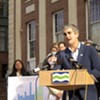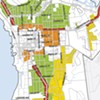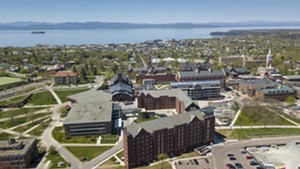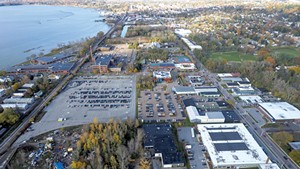
- © Andrii Yalanskyi | Dreamstime
BTV Neighborhood Code, a zoning rewrite months in the making, will allow people to build multifamily homes where they're currently banned. The citywide "upzoning" encourages denser, infill development by allowing more than one building on a residential lot and letting those buildings take up a greater portion of the property.
The version passed by councilors differed slightly from the one proposed by city staff. The council reviewed seven amendments to the plan before settling on the final version.
"This is one of the most important actions the city council has done in the last 12 years," outgoing Mayor Miro Weinberger told Seven Days after the vote.
Weinberger proposed Neighborhood Code in late 2021 as part of a 10-point housing plan. Monday's meeting was his last in office. "This will change the trajectory of housing in our neighborhoods," he said. "It will unlock the door to more people being able to enjoy the wonderful city that we have here."
Related Weinberger Pushes Zoning Changes to Boost Housing Supply

Weinberger Pushes Zoning Changes to Boost Housing Supply
Off Message
Buildings can take up larger portions of their lots. Those in low-density areas can occupy 45 percent of their lot, compared to the 35 percent allowed previously. Buildings in medium-density areas can cover up to 55 percent of their lot, an increase from the 40 percent lot coverage allowed before.
The version approved on Monday allows for slightly less density than the original proposal did. Initially, buildings in medium-density areas would have been allowed to cover 60 percent of their lots and have 10 total units. Outgoing Councilor Zoraya Hightower (P-Ward 1) introduced amendments to reduce lot coverage to 55 percent and eight total units after hearing some residents' concerns that even low-density areas would become much denser under the new rules.
The council also made concessions for the Ward 1 neighborhood bounded by Mansfield Avenue and Pearl, North Willard and Archibald streets. Originally, that area was proposed to go from low to medium density. But residents there argued that their proximity to the University of Vermont made the neighborhood particularly susceptible to developers snatching up real estate, razing existing homes and building larger ones for college students, further disrupting the balance between undergrads and long-term residents.
Councilors largely agreed, voting 8-4 to approve an amendment from Councilor Tim Doherty (D-East District) to allow the neighborhood to remain low density. The councilors opposed — Ali Dieng (I-Ward 7), Gene Bergman (P-Ward 2), Joe Magee (P-Ward 3) and Melo Grant (P-Central District) — argued that it wasn't fair for one neighborhood to get a carve-out when others would be upzoned.
Related Burlington Considers Zoning Changes to Encourage More Home Building

Burlington Considers Zoning Changes to Encourage More Home Building
Development
Several speakers during the meeting's public forum argued that the plan should be sent back to committee for further review, particularly when a new mayor and five new councilors will take office next week. Those opposed to the proposal included more than 300 people who signed a petition titled "Neighborhood Code — we must do better" and nearly three dozen people from the Lakeside neighborhood who submitted a letter listing their objections. Among them: Denser housing development will worsen stormwater runoff and take up needed parking spaces.
"We fear that these sweeping changes may be too much too soon and may affect irreversible consequences that in retrospect may be viewed as problematic," the Lakeside neighbors wrote.
Other speakers said the council should pass the proposal without delay. They included Michael Monte, CEO of affordable housing developer Champlain Housing Trust, who said that while the code isn't perfect, it's a good start. Monte said the housing trust is eyeing a project on St. Paul Street that, under previous zoning, would have only allowed a three-unit building. Under Neighborhood Code, the project could have 13 units, Monte said.
"[Neighborhood Code is] not going to solve homelessness. It's not automatically just going to create affordable housing everywhere," he said. "It will create opportunity, it will create variety, and it will create community."
Councilor Hightower, whose last meeting was Monday night's, said she thinks that the final version is a good compromise.
"It is rare that on such a contentious issue that we have so much agreement across the two parties that make up the majority of our council," she said. "I'm glad to see so much support for this, and I'm glad we could pass some amendments to make it hopefully feel better to more Burlingtonians."
Earlier in the meeting, councilors unanimously voted to accept a $34 million federal grant to expand the Burlington International Airport.
The so-called "Project NexT" will demolish the airport's existing north concourse and replace it with a larger terminal that can accommodate larger aircraft, office space and an outdoor patio. The new building, outfitted with rooftop solar panels and a geothermal field, will produce as much energy as it consumes, according to Director of Aviation Nic Longo.
The project has been part of the airport's master plan for close to a decade. Federal funds will cover 90 percent of the cost. The remainder will come from "passenger facility charges," or fees tacked onto ticket prices.
Related Vermont and City of Burlington Sever Ties With Russia

Vermont and City of Burlington Sever Ties With Russia
Off Message
The arrangements come about two years after Burlington suspended its sister-city program with the Russian city of Yaroslavl following Russia's invasion of Ukraine. The program had been in place since 1988.
In his 2023 State of the City address, Mayor Weinberger suggested Burlington explore a sister-city relationship with a community in Ukraine. Since then, officials met a member of Ukrainian Parliament who introduced them to Kuyalnick. The city is known for its "famed borscht festival," the resolution says.
The West African city of Thies East is the childhood home of outgoing Councilor Dieng. He attended middle school with the city's current mayor and returned there last summer to start the sister-city program, Burlington's first in Africa. The Vermont National Guard has had a military partnership with Senegal since 2008.
City officials say the arrangements will create opportunities for educational and cultural exchange. Both must be reviewed by city attorneys.
Lastly, councilors took a moment to recognize their peers whose terms end on April 1. Weinberger presented plaques to City Council President Karen Paul (D-Ward 6) and Councilors Dieng, Hightower, Magee and Hannah King (D-Ward 8).
Paul, the longest-serving councilor of those moving on, thanked her family and constituents. She also gave a special shout-out to Lori Olberg, city hall's licensing, voting and records coordinator, who also staffs city council meetings.
Paul then reflected on her tenure as only a certified public accountant would: by crunching the numbers. In her 16 years on the council, Paul said she had served with two mayors, five city council presidents, 42 city councilors and attended 420 meetings.














Comments
Comments are closed.
From 2014-2020, Seven Days allowed readers to comment on all stories posted on our website. While we've appreciated the suggestions and insights, right now Seven Days is prioritizing our core mission — producing high-quality, responsible local journalism — over moderating online debates between readers.
To criticize, correct or praise our reporting, please send us a letter to the editor or send us a tip. We’ll check it out and report the results.
Online comments may return when we have better tech tools for managing them. Thanks for reading.